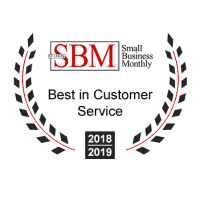
A month ago, in the middle of the lockdown we have been patiently enduring, the International Monetary Fund (IMF) predicted that a coming recession could be "the steepest in almost a century," approaching levels not seen since the Great Depression. Between a worldwide pandemic and skyrocketing unemployment levels, it's no wonder that business owners are worried.
Even at the best of times, the U.S. economy is fluid. Depending on the health of the national and global stock markets, your customers may either be comfortable investing in your products and services or anxious, withholding their dollars just in case financial catastrophe strikes.
Over the centuries since the founding of the United States, our nation has been affected by no fewer than 11 recessions. Although these times can be scary for consumers and businesses alike, this is a natural pattern in our nation’s economic development. That’s why it’s important to know how to leverage today’s technology to ensure your business’ longevity through the next impending stock market dip and beyond.
Many business owners, faced with a looming recession, are cutting costs and making difficult decisions about what to prioritize going forward. One decision likely has to do with their marketing budget.
You may be considering scaling back your marketing efforts, too.
In our opinion, cutting your team's marketing efforts in half or even entirely is a big mistake. We believe that digital marketing can help companies now more than ever. Here are just 3 reasons why:
Your website works when you can't. It's on 24/7. If it's not providing your customers with clear information and an easy-to-navigate design, you may be missing out on valuable customer dollars. Digital marketing can give your website a timely refresh.
And if you're not getting seen, you're losing business. With the help of digital marketing, you can get nearer to that top spot on Google and draw more people to your website.
More screen time means more of an opportunity to reach out to your audience via social media. Are you taking advantage? Digital marketing can help by providing your users with engaging content and earning you a broader reach.
When your brand’s steady income is interrupted by a recession, it may seem logical to trim your expenditures where you can; unfortunately, ads aren’t where you want to do it. Whether you’re managing various ad campaigns through your brand’s social media profiles or AdWords, reducing output on these platforms is actually more likely to hurt your business than empower it.
Remember: the more eyes that see your brand, the more people are likely to invest in what you have to offer. Keep your visibility up by maintaining your monthly ad output.
The internet is an intrinsic part of daily life. Just because the economy is a bit strapped for cash doesn’t mean consumers will stop surfing the web for information, entertainment, and the occasional purchased good. Take this time to increase the likelihood of your brand catching consumers’ attention by bolstering content production.
Especially if you can find a way to connect your brand to the struggles brought on by an economic crisis, examine how your business can provide sound advice, tips, information and even products/services to improve the way your customers survive the recession alongside your company. Showing support and relating to your audience may even help your brand earn some extra customers to help you through these hard times.
Content is powerful, but it isn’t effective if no one can see it. Search engine optimization is the driving force behind your brand’s ability to be identified, categorized and ranked by search engines, such as Google and Bing. If you set up and maintain a comprehensive SEO strategy, you can keep your brand’s content at the top of search rankings for months, if not years, to come.
We briefly mentioned social media in tip #1, but there is so much more this platform can do than just serve up ads to targeted groups of people. Since social media found its way into the hearts of online users everywhere, Facebook, Twitter, Instagram, Snapchat and their counterparts have become monumental pillars in modern communication. Today, people use these platforms to engage with one another, share their views on heavy-hitting topics, and offer a glimpse into their daily lives.
And if they’re doing this, why can’t your brand do the same?
With the help of some cleverly designed social media campaigns, your brand can engage with its audience and build relationships on a deeper-than-transactional level.
It may be hard to believe, but a recession is the perfect opportunity to take a long hard look at your website and analyze its design, functionality, and ease of use. Especially during a time as emotionally and financially stressful as a recession, customers deserve to have the least amount of clutter in between the information they need and the products/services they’re looking for.
In fact, the more clicks a customer has to make before he/she can find what he/she is looking for on your site, the less likely your customer is to convert, which ultimately hurts your bottom line. As a result, trim any unnecessary menus and graphics from your site; make it as simple and elegant to use as possible.
Finally, the biggest tip of them all… Despite how heavily your brand feels the effects of the recession, there’s a good chance your customers are just as affected – if not more so – than your business.
At the end of the day, your customers are not dollar bills or sales quotas; they are human beings filled with needs, emotions, and challenges, particularly during times of financial hardship. If your brand can keep them at the forefront of everything it does – if you can make them feel empowered during this difficult time – you stand a chance at generating the revenue you need for a long and bright future.
Okay, so far we’ve discussed six ways you can elevate your brand’s likelihood of surviving economic stress, but now you want some proof.
In the great recession of 2009, these brands were able to leverage their marketing strategies to rise above adversity and even thrive:
In an interview with Adweek, Del Monte’s CMO, Bill Pearce, discussed the success of increasing Del Monte’s ad spends during the recession:
“I think we’re making very good progress. If you go back to our September earnings and benchmark versus our peer set, we’re doing very well...Our marketing capability has improved dramatically, and I think people are generally excited and feel good about where we’re going.”
Despite the auto industry struggling, as a whole, to break even during 2009, much less generate a profit, Hyundai forged a different route to success. By taking the time and care to invest in a consumer-focused ad-campaign-turned-into-a-service, Hyundai Assurance boosted sales as much as 5 percent while the competition floundered.
Sometimes fitting into a consumer niche is the best way to survive an economic crunch. Identifying an opportunity to push an affordable product to thirsty consumers, the Miller Brewing Company leveraged a series of one-second TV ads that aired during the biggest football game of the year to promote Miller High Life beer. This strategy ultimately resulted in Miller generating a 5 percent increase in beer sales prior to the game and 9 percent increase following the game.
If you could take all of the many ingredients of a complex marketing strategy – content, social media, SEO, web design/development, ad spends, analytics, etc. – and boil it down to one overarching concept, the result is simple: marketing leads to exposure.
During a recession, when the limits of every dollar bill matters to a company trying to survive, your business may be naturally looking to cut spending. As a marketing agency, we’ve seen all kinds of companies with various understandings of marketing and why it’s essential to financial growth; that’s why we can unequivocally say.
Don’t let your marketing strategy be the first expense on the chopping block!
Your brand needs marketing to ensure your consumers continue to see your products and services. And in many cases – as mentioned in the examples above – a recession may even be a great time to invest more into your marketing endeavors. With the right strategy in place, your brand doesn’t just have a chance at surviving a recession; it can become an industry leader.
























